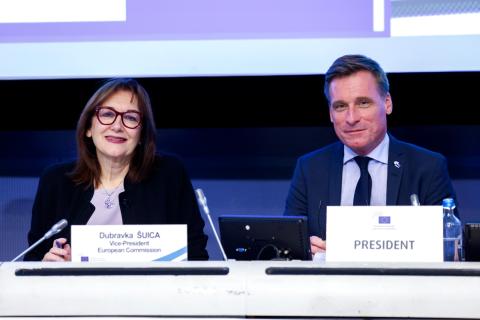European Economic
and Social Committee
In a debate with Commission Vice-President and Commissioner for Democracy and Demography Dubravka Šuica, the EESC called for a strategy on civil dialogue as a first step towards strengthening the role of civil society and increasing citizen participation in EU policy-making.
The European Economic and Social Committee (EESC) put forward its demands in the opinion Strengthening civil dialogue and participatory democracy in the EU: a path forward, adopted shortly after the debate held at the EESC's plenary session on 15 February.
It stressed the urgent need to step up the implementation of Article 11 of the Treaty of the EU (TEU), under which the institutions have a joint responsibility to ensure that organised civil society is actively involved in formulating EU laws.
This should be done as a follow-up to the Conference on the Future of Europe (CoFoE), a landmark initiative and major democratic exercise, which included a series of citizen-led debates on matters that directly affect them in their lives.
'We can all agree that citizens' voices must be heard beyond the ballot box. We, in the EU institutions and bodies, must all become better at involving civil society in meaningful dialogue beyond mere information and consultation,' said EESC President Oliver Röpke.
Building a more transparent, inclusive and democratic EU requires increased civic engagement and a strong partnership between the EU institutions and national governing bodies. 'Our collective efforts will ensure that the EU remains a beacon of hope and a model of participatory democracy for the world,' Commissioner Šuica stressed.
Pietro Barbieri, rapporteur of the opinion, stated: 'With this opinion, the EESC is inviting the European institutions to take a concrete step forward: to adopt a strategy for civil dialogue, giving life to an action plan and an interinstitutional agreement that involves every level of the EU. The EESC's commitment is a sign of an urgent need that cannot be renounced or postponed.'
Miranda Ulens, co-rapporteur, added: 'We already have good practices for social dialogue. The proposals we make will ensure that the voices of other legitimate and representative organisations can be heard too. Let's create a real, democratic Europe for its citizens! #TogetherStrong!' (ll)
